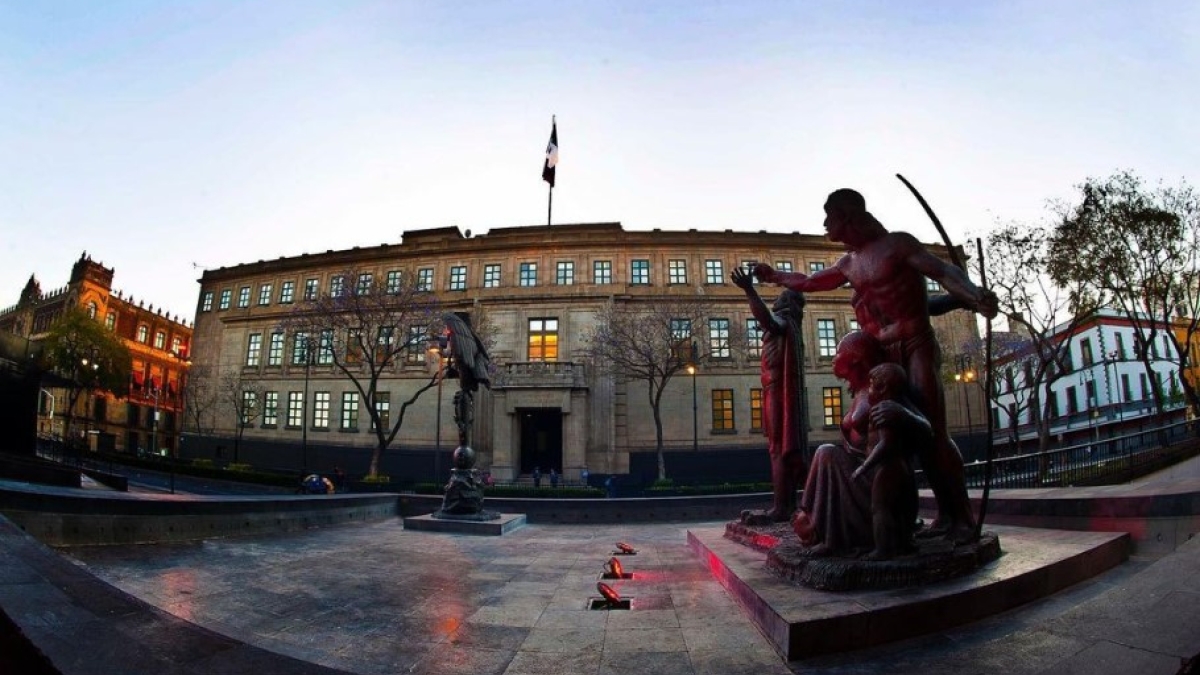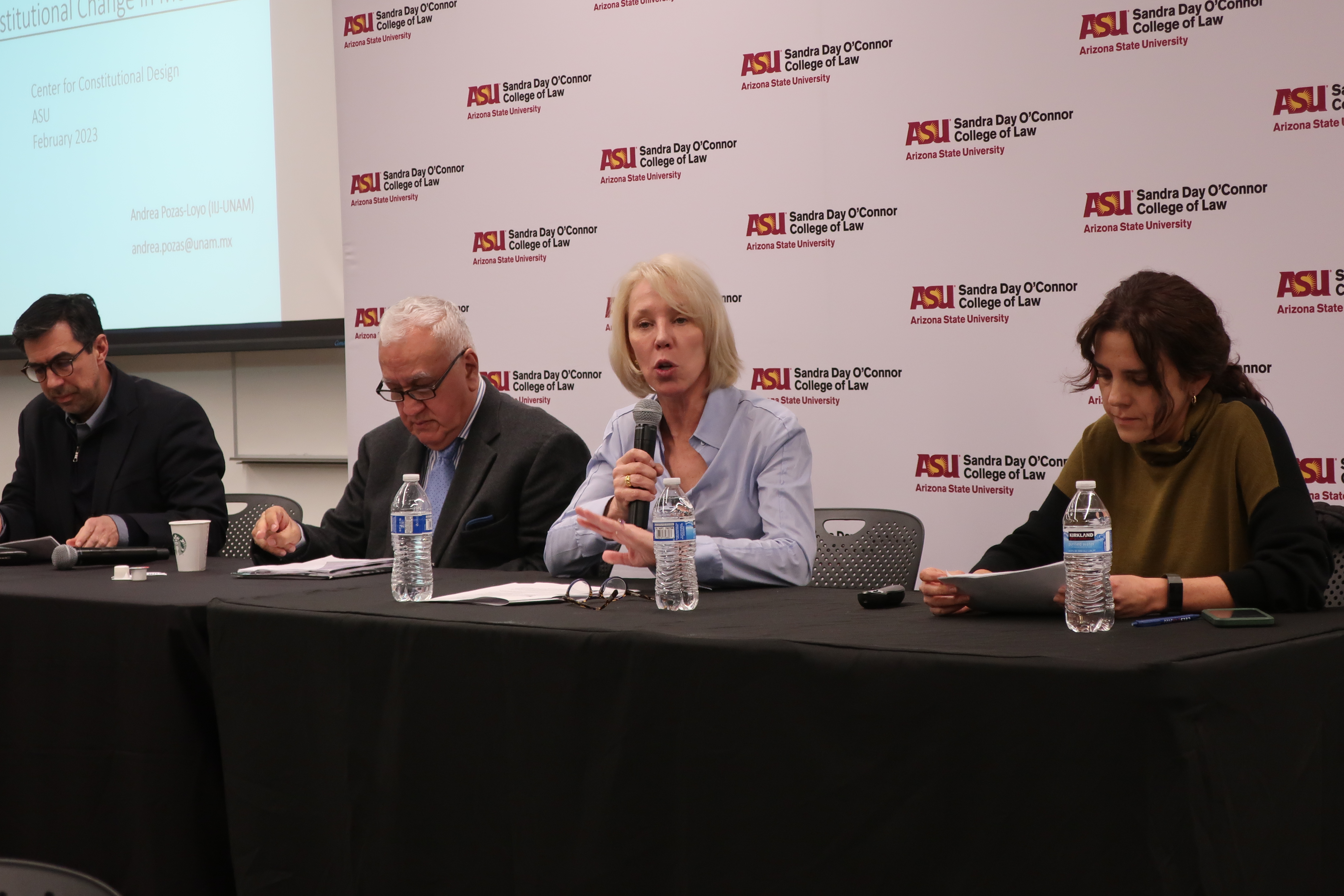As Mexican lawmakers passed sweeping reforms Feb. 22 to revamp the country’s electoral agency responsible for elections, a panel of experts discussed the dilemma seen by observers as a threat to the future of Mexico’s democracy.
Arizona State University’s Center for Constitutional Design hosted three distinguished scholars in the areas of Mexico’s constitution and politics for an event on the Downtown Phoenix campus. The scholars provided a history of the nation’s guiding document and weighed in on the current developments spearheaded by the administration of President Andrés Manuel López Obrador.
López Obrador's administration is inching closer to unraveling the nation’s governmental system that did not achieve democracy until 2000, after 70 years of one-party rule by the Partido Revolucionario Institucional, or PRI.
“Mexico was ruled by hegemonic party for seven decades, but in 1988 the PRI lost the capacity to unilaterally amend the constitution since it no longer had two-thirds majority in the chamber of deputies,” said Andrea Pozas-Loyo, a professor at the Institute of Legal Research at the Universidad Nacional Autónoma de México and a distinguished research fellow in constitutional studies at the University of Texas Law School. “Political fragmentation grew, as did the rate of amendments, and in 2000, the PRI lost the executive (control) for the first time.”
Enacted in 1917, Mexico’s constitution has been amended 729 times, making it the third most amended in history after the 1874 Swiss constitution and New Zealand’s “flexible” constitution of 1852, Pozas-Loyo said. In contrast, the U.S. Constitution has been amended 27 times.
The continuous amendments, or hyper-reformism, obstructed the development and execution of constitutional mandates and made it difficult to build “judicial interpretation,” she said.
“It’s paradoxical that constitutional reform enabled constitutional transitions, but it blocked constitutional and democratic consolidation,” Pozas-Loyo said. “This is where we were in 2018. The country had gone almost two decades of democracy and we had been able to construct a constitutional framework that enabled checks and balances in power.
“Poverty had been declining, but on the other hand, there was an increasing discontent with corruption and inequality, and this led to a landslide election of current President López Obrador.”
Prior to López Obrador and his National Regeneration Movement, the newest political party, the presidency was held by the National Action Party from 2000 to 2012, then by the PRI until 2018.
Constitutional reforms beginning in 1977 and focused on political representation and organization of elections paved the way to democratic rule in 2000, said Julio Ríos-Figueroa, an associate professor in the Department of Law at Instituto Tecnológico Autónomo de México.
ASU Professor of law and political science Stefanie Lindquist gives opening remarks during the panel discussion on Mexico’s constitution held Feb. 22 in the Beus Center for Law and Society on the Downtown Phoenix campus. Pictured (from left) are Julio Ríos-Figueroa, associate professor in the Department of Law at Instituto Tecnológico Autónomo de México; Manuel González, career professor at the Faculty of Law, Graduate Studies Division, Universidad Nacional Autónoma de México; Lindquist; and Andrea Pozas-Loyo, professor at the Institute of Legal Research UNAM. Photo by Jerry Gonzalez/ASU
“As the country grew more complex, the PRI, the party in power, wisely started opening the door to welcome new political parties, new demands,” Ríos-Figueroa said. “And the way of opening the door was via the electoral reforms that made representation easier, for instance, proportional representation reforms, and also that made the counting of votes and the organization of elections easier and more credible.”
Subsequently, Mexico’s electoral agency, the Federal Electoral Institute (FEI), was established in 1990 to manage elections independently of the government. Today, it is responsible for the operation and staffing of 100,000 polling stations.
“Before the electoral institution was created, the counting and organizing of elections was in the hands of the government itself, much like in the U.S. still,” Ríos-Figueroa said. “But in Mexico, the government was not credible because it was a hegemony party.”
All the progress achieved through past constitutional amendments that eventually led to democratic elections is now in jeopardy after the Feb. 22 passing of the law that in part seeks to cut the FEI’s civil service workforce by 80%. This effort, referred to as “Plan B,” by López Obrador's administration, forces change through legislation instead of constitutional amendment.
“It has to be said that the current government is absolutely legitimate; it won the elections in 2018 by a huge majority, fifty-something percent,” Ríos-Figueroa said. “It is a legitimately, democratically elected government.
“That’s why it is in part hard to come to terms with the fact that they are actually undermining the core institution that made this government and the previous democratically elected governments possible.”
Opposition to the new law is mounting, as lawsuits are being filed to declare the new legislation unconstitutional. The decision is now up to Mexico’s Supreme Court of Justice of the Nation, where eight of 11 chief justices must vote against the law. Their decision will be pivotal as Mexico heads toward major elections in 2024.
“It’s a country of 130 million people, 80 million voters, the election will be huge,” Ríos-Figueroa said. “It’s not only the presidency, but also both legislative houses and many state governments.”
Even if the supreme court upholds the law, other avenues can be pursued, said Manuel González, a career professor at the UNAM Faculty of Law in the Graduate Studies Division and a renowned constitutional scholar.
“The opposition would challenge to the last resort,” said González, who was part of the electoral reforms of 1996, which were key to the first democratic elections of 2000. “Beyond the supreme court, there is another court, an electoral court. It could be challenged in different ways through the electoral court.”
Many outcomes are possible in the electoral court, González said. Mexico could become a parliamentary system, one where future presidents can change the constitution through legislation, as long as they are members of the parliament.
“There have been at least three projects to adopt the parliamentary system in Mexico in the past, but they have been rejected,” González said. “This president conducts and behaves (in a parliamentary) way. That would be the decline of the presidential system in Mexico; we would depart from the United States.”
López Obrador's Plan B brings a certain level of uncertainty as it takes the country to a state of democratic regression, Pozas-Loyo said. Increased instability and violence may ensue.
“It will be really sad because we would have the whole arc,” Pozas-Loyo said. “We will have a constitution that was able to produce a very slow transition to democracy through reforms, little by little. Then we would have attained democracy in 2000, followed by backsliding as the government created transformation, de facto of the constitution, through legislation.
“Sad because our constitution would have been able to create democracy but not consolidate it.”
The “perennial” question is how to consolidate and perpetuate democracy, said Stefanie Lindquist, panel moderator and professor of law and political science in the School of Politics and Global Studies and the Sandra Day O'Connor College of Law at ASU.
“Thank you for educating us,” said Lindquist, who is also executive director of the Center for Constitutional Design. “I think we will all walk away much more aware of the current situation in Mexico, how it could ultimately change for the worst in terms of democratic backsliding, and how we need to pay attention.”
Top photo: Exterior view of Mexico's Supreme Court of Justice of the Nation building. Photo courtesty SCJN
More Law, journalism and politics

Exhibit uses rare memorabilia to illustrate evolution of US presidential campaigns
After one of the most contentious elections in history, a new museum exhibit offers a historical perspective on the centuries-old American process.“We The People! Electing the American President” had…

TechTainment conference explores the crossroads of law, technology, entertainment
What protections do writers, actors, producers and others have from AI? Will changing laws around name, image and likeness (NIL) eliminate less lucrative college sports programs?And what does…

How to watch an election
Every election night, adrenaline pumps through newsrooms across the country as journalists take the pulse of democracy. We gathered three veteran reporters — each of them faculty at the Walter…

